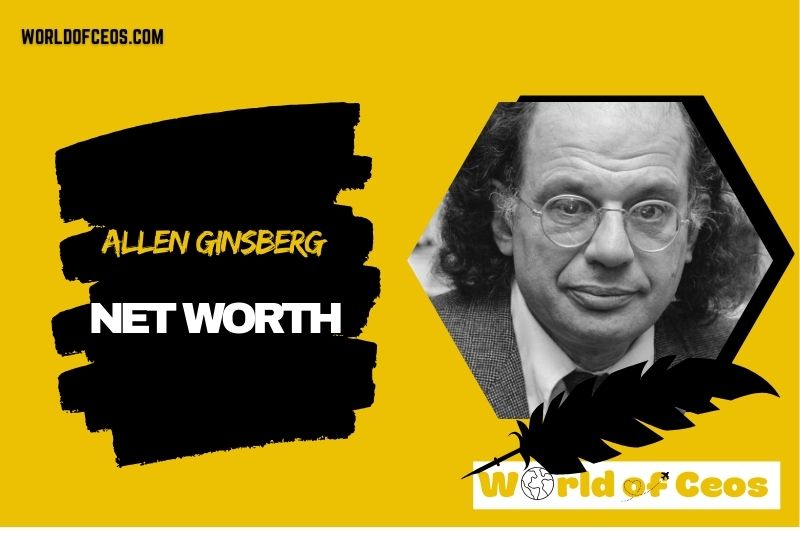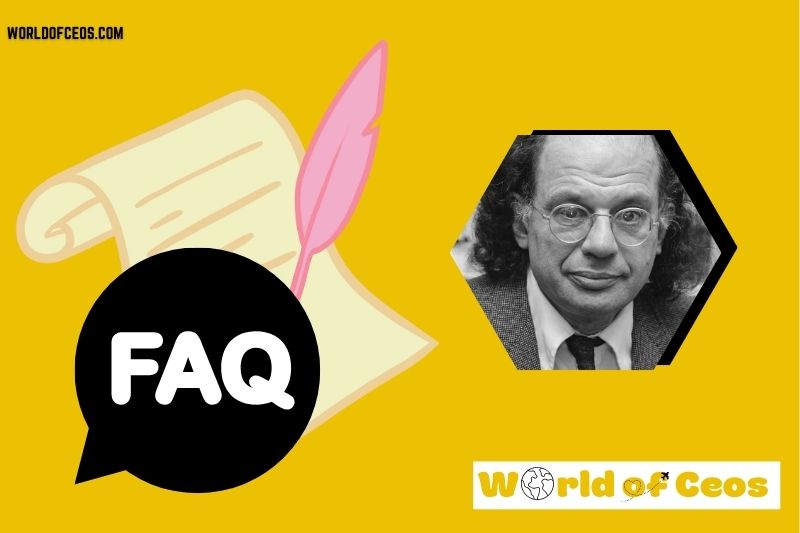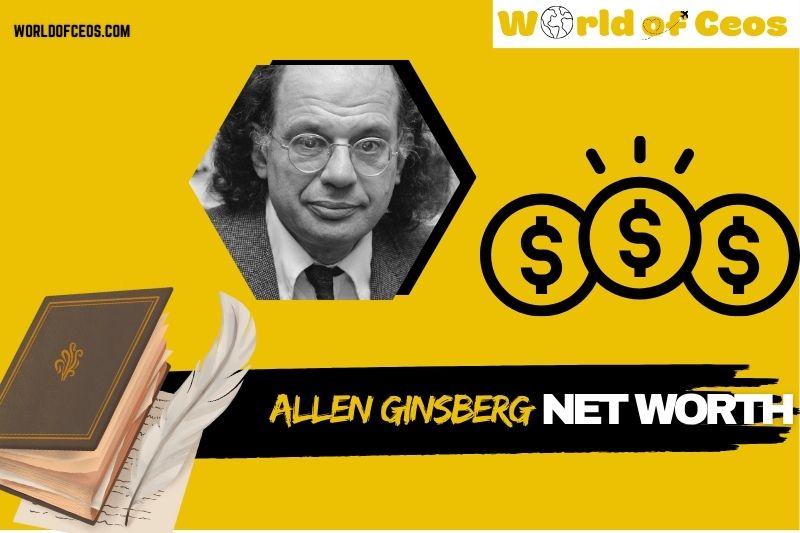Allen Ginsberg was an iconic poet of the Beat Generation, best known for his groundbreaking poem Howl and his bold advocacy for freedom of expression.
Through his literary work, awards, and influence, he built a lasting legacy in both cultural and financial terms.
As WorldofCeos, I’m here to break down Ginsberg’s achievements, his income sources, and everything contributing to his wealth.
So, let’s dive into what exactly makes Allen Ginsberg net worth and life remarkable in 2024.
Quick Facts
| FACT | DETAIL |
|---|---|
| Real Name | Irwin Allen Ginsberg |
| Popular Name | Allen Ginsberg |
| Gender | Male |
| Birth Date | June 3, 1926 |
| Age | 70 (died at April 5, 1997) |
| Parents | Louis Ginsberg, Naomi Levy |
| Siblings | Eugene Brooks |
| Birthplace | Newark, New Jersey, USA |
| Nationality | American |
| Ethnicity | Jewish |
| Education | Columbia University |
| Marital Status | Unmarried |
| Spouse | N/A |
| Children | None |
| Dating | Peter Orlovsky |
| Net Worth | $3 million |
| Source of Wealth | Literature, Activism |
| Height | 5 ft 9 in (1.75 m) |
What is the Net Worth of Allen Ginsberg in 2024?

Allen Ginsberg’s net worth is an estimated $3 million. Though modest compared to some contemporary authors, this figure reflects his influence in literature and culture rather than sheer wealth accumulation.
Ginsberg’s fortune places him among influential literary figures but notably lower than certain richest authors whose works cater to mainstream audiences. Compared to others in his field:
- Jack Kerouac
- William S. Burroughs
- Bob Dylan
- Gregory Corso
- Timothy Leary
- Anne Waldman
- Hunter S. Thompson
- Neal Cassady
- Gary Snyder
- Ken Kesey
For those curious, the value of Ginsberg’s estate resonates with the cultural capital he built, more than his financial legacy.
Allen Ginsberg Salary and Finance Overview

His Life and Influence on Wealth
Allen Ginsberg’s life shaped not only his poetry but also his earnings. Raised in a family immersed in literature and Marxist ideals, Ginsberg developed a unique view on wealth, often opposing materialism and economic constraints.
His modest lifestyle meant he focused on experience and influence over wealth, living in simple East Village apartments and sourcing clothes from thrift stores.
This lifestyle, combined with his literary success, allowed Ginsberg to maintain a stable but modest fortune. He pursued wealth only as far as it could support his creative and activist pursuits, embodying the values he advocated.
Achievements and Awards that Contributed to His Financial Legacy
Ginsberg’s literary accolades brought him fame and some financial rewards. His poem Howl gained massive attention and is still widely studied. His work earned the National Book Award for Poetry in 1974, a notable achievement that contributed both prestige and some monetary benefits.
Being inducted into the American Academy of Arts and Letters and becoming a Pulitzer Prize finalist in 1995 for Cosmopolitan Greetings further elevated his influence. These awards, while not huge moneymakers, solidified his legacy and indirectly contributed to his net worth.
The Influence of “Howl” and Other Major Works
Howl, Ginsberg’s seminal work, did more than establish his career—it became a cultural phenomenon. The poem’s controversial trial, which was a landmark case in literary freedom, brought him significant public attention.
Publications like Howl and Other Poems sold well in certain circles, particularly in partnership with City Lights Bookstore. Although Ginsberg wasn’t in it for the money, royalties from Howl and other writings consistently contributed to his income.
Income Sources Beyond Poetry
Ginsberg’s main income came from his published works and paid readings. He was known for public readings across the world, including his last reading at the Booksmith in San Francisco.
Additionally, he co-founded the Jack Kerouac School of Disembodied Poetics at Naropa Institute with Anne Waldman, generating income while promoting the next generation of poets. His simple, communal lifestyle and association with beatnik culture didn’t require high earnings, so these sources met his needs.
Political and Social Activism
Ginsberg’s commitment to political causes, from anti-war protests to civil rights activism, reflects his investment in social wealth over personal fortune. He was heavily involved in the counterculture movement, which prioritized social change over financial gain.
His activism likely impacted his finances, as he often prioritized causes over career stability, but his involvement helped cement his position as an icon.
Additionally, his lifelong Buddhist practice contributed to his financial choices, encouraging minimalism over wealth accumulation.
Personal Relationships That Impacted His Legacy
Ginsberg’s lifelong relationship with Peter Orlovsky, his partner and muse, influenced his works and personal life. Orlovsky and Ginsberg shared financial burdens, working together on poetry and supporting each other’s artistic pursuits.
His friendships within the Beat Generation, especially with William S. Burroughs and Jack Kerouac, were crucial to his career. By associating with these figures, he gained access to collaborative works, joint readings, and a shared audience that increased his reach and income potential.
Legacy and Cultural Influence After His Death
After Ginsberg’s death in 1997, his influence continued, both financially and culturally. Institutions like the Jack Kerouac School have carried on his ideals, and his works remain influential in literature courses globally.
Today, his impact on American poetry, freedom of speech, and the Beat Generation culture drives ongoing interest in his life and legacy, maintaining the relevance and value of his estate.
FAQs about Allen Ginsberg

What major works is he known for?
Ginsberg’s most famous work is Howl, along with other major poems like Kaddish and The Fall of America.
Was he involved in any social movements?
Yes, Ginsberg was active in anti-war protests, the civil rights movement, and supported freedom of speech, often participating in political demonstrations.
How did his relationship with Peter Orlovsky impact his life?
His partnership with Orlovsky was central to his life, providing emotional and creative support, influencing his poetry, and shaping his personal philosophy.
What awards did he receive?
Ginsberg won the National Book Award for The Fall of America in 1974 and was a Pulitzer Prize finalist in 1995 for Cosmopolitan Greetings.
Why was Howl significant?
Howl was revolutionary for its critique of materialism and conformity, pushing boundaries in literature and sparking a high-profile obscenity trial.
What financial philosophy did he follow?
He believed in minimalism, living modestly, and often spoke against economic materialism, valuing cultural wealth over personal gain.
How did Buddhism influence his lifestyle?
As a Buddhist, Ginsberg emphasized a simple life, focusing on mindfulness and detaching from material possessions, which influenced his financial choices.
How did he influence the Beat Generation?
Ginsberg’s writings and his lifestyle became a defining part of Beat Generation culture, shaping American counterculture ideals of the 1950s and 1960s.
Where did he study?
Ginsberg attended Columbia University, where he met several figures in the Beat Generation, including Jack Kerouac and William S. Burroughs.
What was his role in the Jack Kerouac School?
Ginsberg co-founded the Jack Kerouac School of Disembodied Poetics to encourage young poets, which aligned with his vision of open expression.
Conclusion
Allen Ginsberg’s impact reaches far beyond his poetry, resonating through his activism, lifestyle, and dedication to free expression.
Leave a comment or share your thoughts on worldofceos.com to join the conversation!

